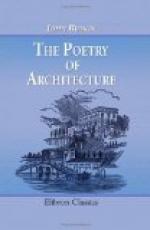131. We must not, therefore, be surprised if, on leaving Italy, where the crowd of poverty-stricken nobility can still repose their pride in the true villa, we find no farther examples of it worthy of consideration; though we hope to have far greater pleasure in contemplating its substitutes, the chateau and the fortress. We must be excused, therefore, for devoting one paper more to the state of villa architecture in Italy; after which we shall endeavor to apply the principles we shall have deduced to the correction of some abuses in the erection of English country houses, in cases where scenery would demand beauty of design and wealth permit finish of decoration.
III.
THE ITALIAN VILLA (Concluded).
132. We do not think there is any truth in the aphorism, now so frequently advanced in England, that the adaptation of shelter to the corporal comfort of the human race is the original and true end of the art of architecture, properly so-called: for, were such the case, he would be the most distinguished architect who was best acquainted with the properties of cement, with the nature of stone, and the various durability of wood. That such knowledge is necessary to the perfect architect we do not deny; but it is no more the end and purpose of his application, than a knowledge of the alphabet is the object of the refined scholar, or of rhythm of the inspired poet.
133. For, supposing that we were for a moment to consider that we built a house merely to be lived in, and that the whole bent of our invention, in raising the edifice, is to be directed to the provision of comfort for the life to be spent therein; supposing that we build it with the most perfect dryness and coolness of cellar, the most luxurious appurtenances of pantry; that we build our walls with the most compacted strength of material, the most studied economy of space; that we leave not a chink in the floor for a breath of wind to pass through, not a hinge in the door, which, by any possible exertion of its irritable muscles, could creak; that we elevate our chambers into exquisite coolness, furnish them with every attention to the maintenance of general health, as well as the prevention of present inconvenience: to do all this, we must be possessed of great knowledge and various skill; let this knowledge and skill be applied with the greatest energy, and what have they done? Exactly as much as brute animals can do by mere instinct; nothing more than bees and beavers, moles and magpies, ants and earwigs, do every day of their lives, without the slightest effort of reason; we have made ourselves superior as architects to the most degraded animation of the universe, only insomuch as we have lavished the highest efforts of intellect, to do what they have done with the most limited sensations that can constitute life.




